
Capcom's perennially popular survival horror video game franchise "Resident Evil" has been adapted for both film and television over the years, in live-action and animation. The franchise's cinematic debut began in 2002, loosely following the original game's plot of specialists investigating the nefarious pharmaceutical company the Umbrella Corporation. This leads to Umbrella unleashing the T-Virus, a genetically engineered virus that transforms those infected into ravenous, undead zombies.
While the live-action films have handled the video game source material with varying amounts of fidelity and controversy, there has also been a line of CG animated movies set in the same continuity as the games. Successful worldwide, the "Resident Evil" movies have earned their fair share of fans, including devotees of the games and those new to the franchise. With plenty of films to choose from across the original movie series, 2021 reboot, and animated features, here are the best "Resident Evil" films ranked from worst to best.
Resident Evil: Afterlife

2010's "Resident Evil: Afterlife" marked the first time filmmaker Paul W.S. Anderson directed an installment in the series since the 2002 original movie, after writing and producing the interim sequels. Series protagonist Alice (Milla Jovovich) pursues the sinister Umbrella Corporation around the globe for unleashing the T-Virus, all while spearheading a mission to rescue survivors from the outbreak in Los Angeles. The fourth film introduces "Resident Evil" franchise mainstays Chris Redfield (Wentworth Miller) and nefarious antagonist Albert Wesker (Shawn Roberts) to respectively assist and oppose Alice.
"Afterlife" was made in digital 3D and released after the resurgence of the format following the enormous success of "Avatar" the preceding year, with "Avatar" filmmaker James Cameron an influence on Anderson. That means several major action set pieces in "Afterlife" were designed with that in mind, but they're overly fixated on the presentation of the format rather than crafting a conventionally engaging action sequence. This reveals itself in an overreliance on slow motion, as if Anderson employed them just to show off how cool he believes his usage of 3D is. This leaves "Afterlife" more soulless than the zombies that have overwhelmed the globe -- and painfully boring too.
Resident Evil: Retribution
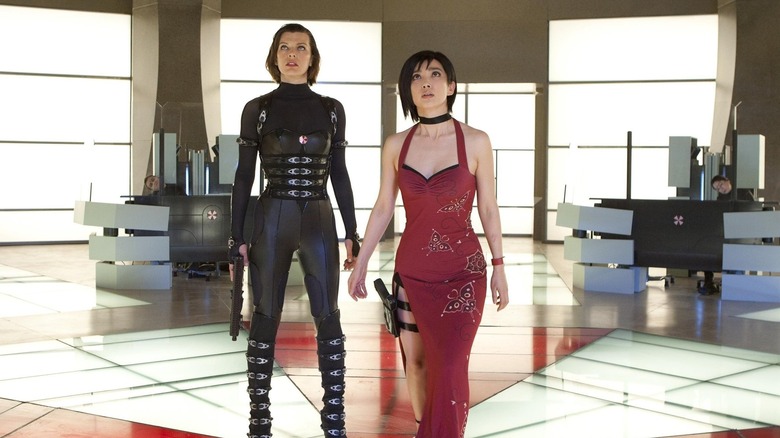
The series' fifth installment, 2012's "Resident Evil: Retribution," doubles down on the 3D format that began with "Afterlife," while also increasing the number of main characters from the video games to appear in the movies. After escaping from Umbrella's custody, Alice learns from Wesker that the Red Queen (Megan Charpentier), the artificial intelligence guiding Umbrella, has gone rogue. This shocking development forces Alice to team up with Wesker and new allies, battling the latest set of Umbrella's monstrous mutations and also evil clones of her old friends.
More than any other "Resident Evil" movie, "Retribution" relies overtly on sheer fan service to pad out its runtime and keep advancing the overarching story. While exploring the inner workings of Umbrella, Alice encounters simulations of different global locales, giving fan-favorite characters like Carlos Oliveira (Oded Fehr) and Rain Ocampo (Michelle Rodriguez) the opportunity to return despite dying in prior movies. These additions put "Retribution" a cut above "Afterlife," but not by much, with the visual effects-heavy action and overstuffed cast overshadowing the movie's better elements.
Resident Evil: Apocalypse
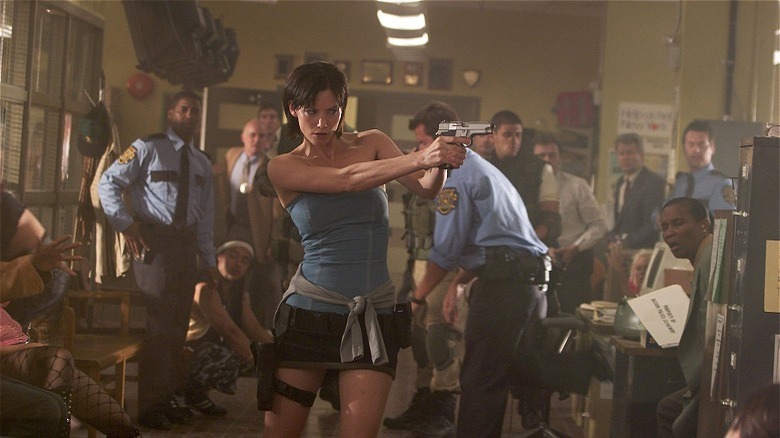
Like the game series it's adapting, "Resident Evil" escalated its scope and stakes from a solitary mansion and lab in the original movie to an entire city teeming with the undead in 2004's "Resident Evil: Apocalypse." As Alice navigates the nearby Raccoon City while ravenous zombies swamp the Midwestern metropolis, she meets with a small group of fellow survivors looking to flee. This evacuation is complicated by Alice being hunted relentlessly by a hulking monster known simply as the Nemesis (Matthew G. Taylor), while Umbrella seeks to cover up the outbreak by annihilating Raccoon City with a tactical nuclear strike.
"Apocalypse," from the original film series, hews closest to the games, loosely following the narratives from "Resident Evil 2" and "3," with the fall of Raccoon City. The increased scope and cast make "Apocalypse" lose its focus significantly compared to its predecessor, only regaining its sense of pace and fun when Alice steps up in the movie's second half. "Apocalypse" proved that "Resident Evil" was no one-hit wonder on the silver screen, though it still had a ways to go before ditching any pretensions of self-seriousness and leaning into absurdist fun.
Resident Evil: Extinction
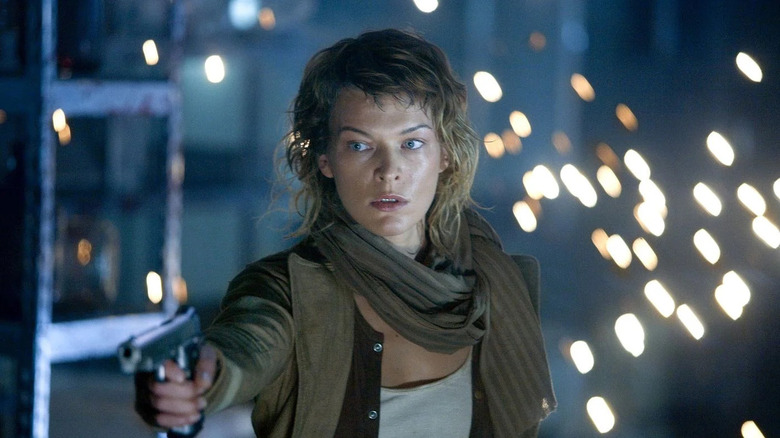
While the "Resident Evil" games kept the effects of the T-Virus largely contained, the movies veered into full-on post-apocalyptic territory starting with its third installment, 2007's "Resident Evil: Extinction." Set five years after the events of "Apocalypse," "Extinction" finds the T-Virus overtaking everything, with humanity on the defensive from zombie hordes sweeping the globe. Meanwhile, the zombie apocalypse also somehow -- it goes unexplained -- adversely affected the climate, leaving much of North America a desert wasteland. With that in mind, "Extinction" feels like "Resident Evil" by way of "Mad Max," as Alice leads a convoy of survivors across North America towards a safe zone in Alaska.
The shift from darkened hallways and ruined cityscapes by night to sunbaked deserts during broad daylight is a welcome one, if only so the action is more clearly displayed than ever. The post-apocalyptic aesthetic works well for the "Resident Evil" franchise and it's a shame that subsequent sequels are a bit too cleanly polished and presented for their own good. Beyond that, there isn't much too remarkable about "Extinction" but it's nice to see the movie series starting to find its own tonal voice.
Resident Evil: Welcome To Raccoon City
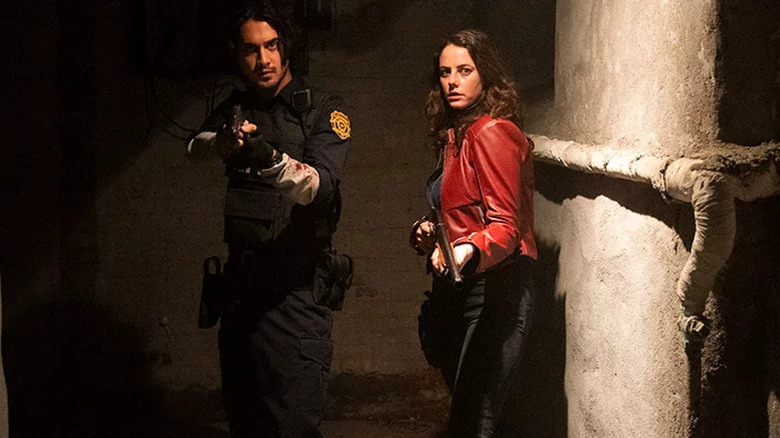
Five years after the original "Resident Evil" film series concluded with "The Final Chapter," filmmaker Johannes Roberts rebooted the cinematic franchise with 2021's "Resident Evil: Welcome to Racoon City." Roberts stuck closer to the games, specifically the first two mainline installments, chronicling a police squad investigating an ominous mansion on the outskirts of town while zombies swarm Raccoon City. Also, rather than rely on a brand-new protagonist like the movies before his, Roberts focused on classic characters from the games, who have all been recast for his adaptation.
"Welcome to Raccoon City" certainly feels familiar to any fans of the games and is loaded with Easter eggs related to the franchise, but it just tries to accomplish too much in its 107-minute runtime. The new cast is earnest enough, with Kaya Scodelario's Claire Redfield being the highlight, and it's the first "Resident Evil" movie in a while that feels scary at times, but the whole thing is a noticeably rushed affair. With such a solid cast and fidelity to the source material, hopefully, these sensibilities will be retained in potential follow-ups because, for all its flaws, "Welcome to Raccoon City" feels more like a franchise love letter than prior adaptations.
Resident Evil: Vendetta
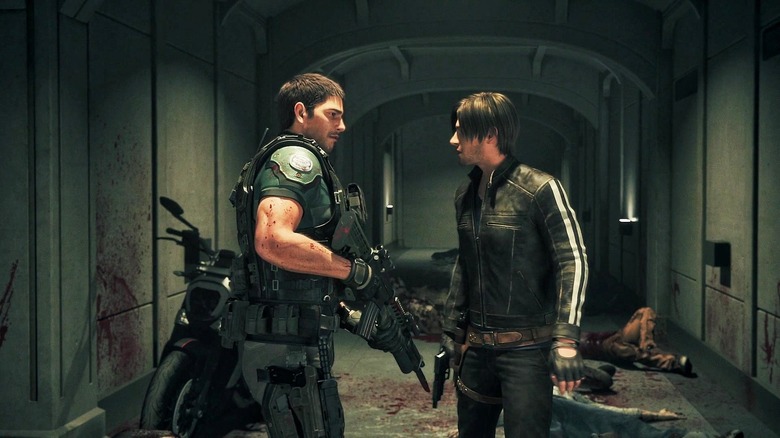
The third CG-animated movie, keeping in canon with the video game series, is 2017's "Resident Evil: Vendetta," set sometime after the events of the sixth mainline game. The movie features Chris Redfield (Kevin Dornan) and Leon Kennedy (Matthew Mercer) teaming up to stop rogue CIA operative Glen Arias (John DeMita) from unleashing a modified virus that transforms those infected into zombies. Matters are complicated further when Arias kidnaps Chris' former colleague, Rebecca Chambers (Erin Cahill), amidst his plans to wreak vengeance on the United States.
"Vendetta" ranks as the weakest animated "Resident Evil" movie so far, with even dedicated fans of the games likely finding the film tedious at points. Some of the extended action sequences are cool and slickly choreographed, particularly a hallway fight with Chris and Leon clearing out a horde of zombies, but the cross-country scope costs "Vendetta" its focus. While certainly not the worst feature film adventure the "Resident Evil" franchise has seen, this movie's 97-minute runtime feels like a blessing in disguise.
Resident Evil
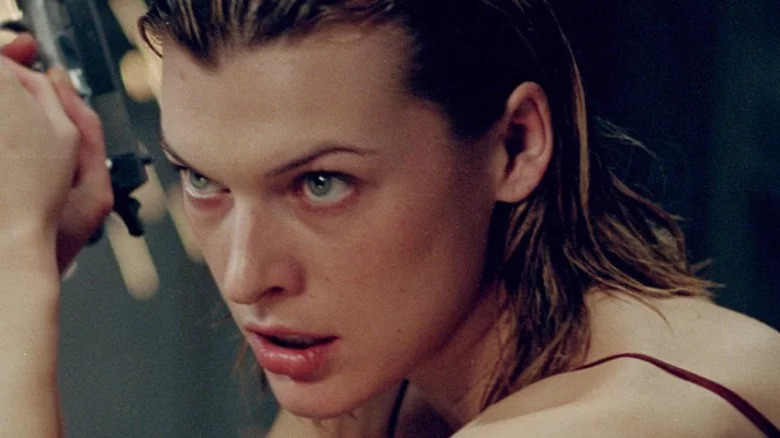
Though likely lost on modern audiences, 2002's "Resident Evil" arrived in theaters at a time when video game adaptations were widely considered exercises in absolute cinematic futility. The original "Resident Evil" did little to ameliorate this reputation with contemporary critics but it did earn a healthy amount of commercial success and its fair share of fans, including James Cameron. More than just kickstarting the long-running film series, "Resident Evil" opened the door for other video game adaptations to be developed, both for the big screen and television.
Alice awakens in a large mansion with no memory of her past life, only to get roped into a raid by an elite group of commandos investigating a secret lab hidden underneath the home. Once inside, the ensemble quickly discovers that the lab has been overrun by zombies and other monsters as they scramble to escape with their lives. Looking back, "Resident Evil" really does feel like a product of its era, with its stylized action and nu-metal soundtrack, but it still stands as one of the best movies in the subsequent series.
Resident Evil: The Final Chapter
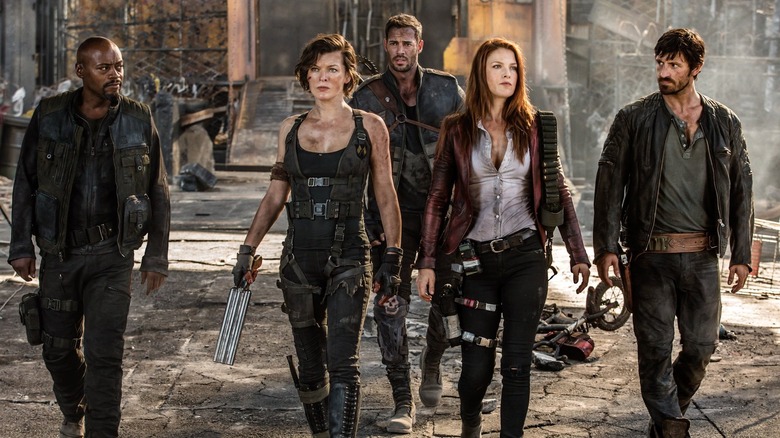
The six-film saga that began with the 2002 original film reaches a satisfying conclusion in 2016's "Resident Evil: The Final Chapter," closing out Alice's story for good. After Wesker betrays her, Alice learns that the true villain behind Umbrella's apocalyptic agenda is mad scientist Alexander Isaacs (Iain Glen), leading to a final showdown for the fate of humanity. Reuniting with Claire Redfield (Ali Larter), Alice takes on Wesker and Isaacs in a bitter rematch to kill the masterminds and save the world.
If "Retribution" revolves around pure, unbridled fan service of the movie series, "The Final Chapter" incorporates more organic nods to its history, particularly its first two installments. However, the biggest boon "The Final Chapter" has going for it is the return of Glen, easily the franchise's most entertaining villain, who was sorely underutilized in "Apocalypse." Between Glen's sneering return and action sequences that feel exponentially more visceral, partially thanks to Anderson not filming the movie in digital 3D, "The Final Chapter" proves the original movies saved its best for last.
Resident Evil: Degeneration
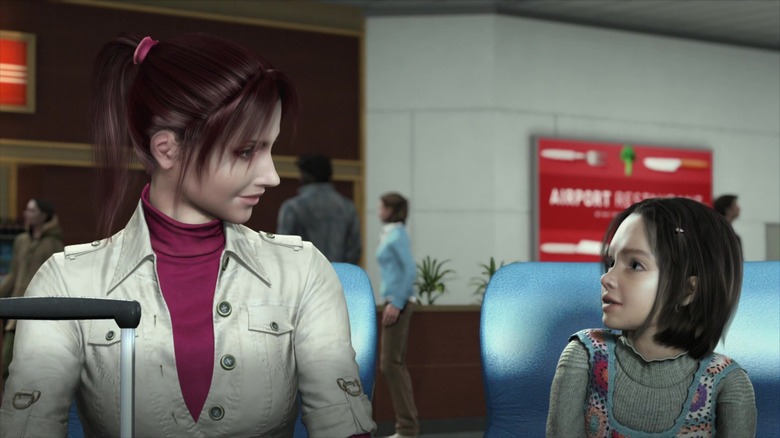
The first feature-length "Resident Evil" animated movie, 2008's "Resident Evil: Degeneration" unfolds shortly after the events of the fourth mainline game. "Degeneration" reunites fan-favorite characters Leon Kennedy (Paul Mercier) and Claire Redfield (Alyson Court) as they investigate another T-Virus outbreak following an attack on an airport. In addition to fighting hordes of zombies, the two uncover a conspiracy involving shady pharmaceutical companies trying to fill the void left by Umbrella.
I never would've expected an animated video game adaptation to deliver such a sharp indictment of Corporate America and the dangers of rampant Big Pharma and yet "Degeneration" somehow delivers on both. "Degeneration" was dismissed by contemporary critics as feeling like an extended cutscene from a game, but the rapport between Leon and Claire proves engaging enough to overcome the more stilted action scenes. Also, "Degeneration" provides fans with Court's final performance as Claire, a role she originated for English-dubbed games to critical acclaim. This movie offers her a fitting send-off.
Resident Evil: Damnation
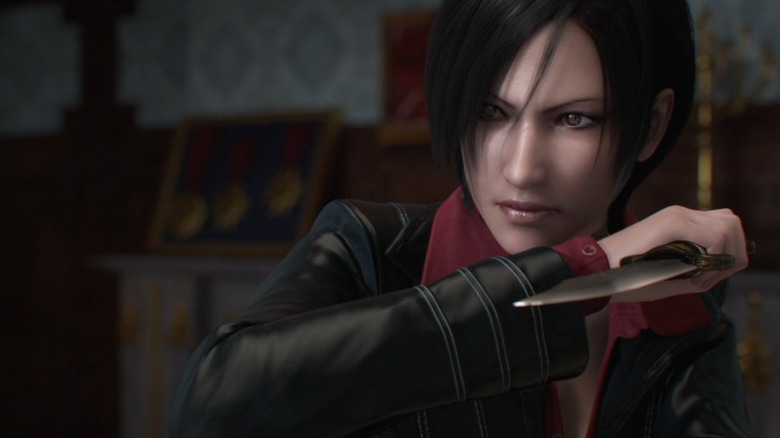
The biggest problem facing the animated "Resident Evil" movies is that, while keeping in canon with the games, most of them aren't particularly accessible for anyone unfamiliar with the lore. 2012's "Resident Evil: Damnation" doesn't suffer from this issue, with the movie presenting a fairly streamlined story that's easy enough for even casual viewers to follow. Set shortly before the sixth mainline game, "Damnation" reunites Leon (Paul Mercier) with femme fatale Ada Wong (Courtenay Taylor) in the midst of an outbreak in Eastern Europe.
There is a lot more life to the action set pieces in "Damnation" than the relatively stilted and tepidly staged sequences in "Degeneration," while Mercier gives his best performance as Leon to date. "Damnation" retains much of the survival horror downplayed in many of the live-action and animated movies, striking a balance between that and the franchise's growing tendency towards overt action-adventure. It's wild to think that the best "Resident Evil" movie is a direct-to-video animated feature, but "Damnation" really does tick all the boxes – charismatic leads, focused story, and genuinely thrilling action scenes. Maybe someday "Damnation" will be recognized for the bar of quality it set, but until then, it's the franchise's best-kept secret.
Read this next: The 30 Best Zombie Movies Of All Time
The post Every Resident Evil Movie, Ranked Worst to Best appeared first on /Film.
from /Film https://ift.tt/x0WA7Z9


No comments:
Post a Comment